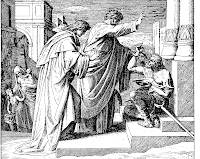
Sorrel mares are not selling well right now. In fact, you might use words like “Edsel” and “DeLorean” to describe how they’re going over.
(Translation for you non-horse people: brown female horses are not what horse people are buying right now.)
That was a bit of a problem for us this weekend because we had two of them to sell (the horses, not the horse people) but it set the stage for some great God stories.
Story #1: On Friday, our first sorrel mare managed to be the second horse sold at the auction. When she brought $500, we were a little disappointed until we heard the later bids for similar horses: $250, $200, $125. We were then rejoicing over what a few minutes earlier we were a little subdued over. Perspective is amazing, isn’t it?
Story #2: Saturday morning, we needed to complete the entry for our second sorrel mare who was in a special catalog show. We had the health papers, the testing done, registration papers, but couldn’t find the bill of sale. A call home (and a patient husband who searched and searched) didn’t uncover the vital document. I knew I had seen it and thought it was with my paperwork. We searched the pickup, the tack box, everywhere we could think of. This was getting to be a panic, because we would forfeit our entry fee and go home without a chance.
Then I remembered I had thrown away a piece of paper the evening before. Maybe I had accidentally pitched the bill of sale? I began digging through the trashcans. I didn’t find the crumpled up sheet but I found the photocopy of our first mare’s pedigree in a clear page protector envelope. Guess what was stuck to the back of the pedigree? Yep, the bill of sale. Among other things, we were thankful for delayed trash service.
Story #3: We were seeing a trend as we watched horses enter the ring in the catalog sale. As the sale progressed, sorrel mares were bringing less and less money until a couple got no bids at all. We needed to sell this mare and waited tensely as she went into the ring. No bids. The auctioneer pleaded. No bids. Suddenly, the trainer, who was riding her, dismounted the mare, dropped the reins, walked calmly around her, mounted on the other side, and began swinging a blue lead rope over her head. Instantly a bid rang out. Phew.
Two quick keys to these stories. First, this whole adventure had been one of trust. We had prayed for several weeks about the sale of these mares. We had entered them in this special auction weekend feeling God had directed us to do so. We had chosen to trust him in whatever he did. The prayers were just a little more fervent when the bill of sale was lost and when a bid was needed badly.
Second, we knew who had worked out the difficulties. God got the praise to our trainer, to her fiancé, and to anyone who wanted to hear the story. This was his sale and we saw him do great things.
Some trust in chariots and some in horses,
but we trust in the name of the LORD our God.
Psalms 20:7




































![[bzrzvec.jpg]](https://blogger.googleusercontent.com/img/b/R29vZ2xl/AVvXsEhPfGK2ZswVhbDSxYZtHnwD38RHsuspM_4Al05ojNaMmr9vpaAHea7rNYzt2HLRptMEYIGhO2DNLJKeEFWH5pb7QFePF-XF8oShx8rJ5f1cyG7ZVqT3bVwK7Vb3UEH9t-0GoVmB-QdqDYU/s1600/bzrzvec.jpg)




